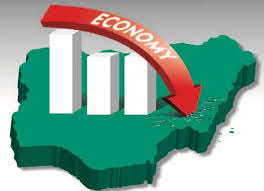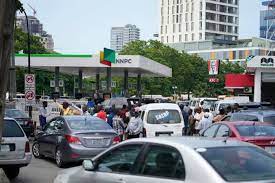Experts have questioned the rationale for continued payment of petrol subsidy especially with millions unable to buy fuel at the official N165 per litre price; BENJAMIN UMUTEME writes.
When it was announced last year that subsidy on fuel will be removed it came as a shock to ordinary Nigerians. Millions of Nigerians condemned the government’s plan but later, the decision was revised with the Minister of Finance, Budget and National Planning, Zainab Ahmed, saying the government would still need to consult with stakeholders before implementing the plan.
This led to a review of the budget leading to the Nigeria National Petroleum Company requesting over N4 trillion as the amount it would spend as under recovery for 2022.
However, with the Russia-Ukraine war, the figure experts fear may hit N6 trillion.
The question many have been asking is that why fuel is still sold above N250, across Nigeria except Abuja?
Subsidy continues to rise
There have been questions over the amount the government throws into fuel subsidies; according to a report by SBM Intelligence, the cost of fuel subsidy increased by 890 per cent between 2017 and 2021.
Following the approval of a revised 2022 budget by the Senate in April, there was an amended upward review of the budget amount for Premium Motor Spirit (PMS) subsidy for 2022 by N442.72 billion, from N3.557 trillion to N4 trillion. And with the Russia- Ukraine war ragging, financial analysts fear, the subsidy might hit N6 trillion.
In a report, early 2022, the World Bank warned that “Risk remains high on increasing fuel subsidies, which could weigh heavily on public finance and pose debt sustainability concerns.”
The group executive director, Cordros Capital Limited, Mr. Femi Ademola, believes the fear raised by the World Bank is a very real one. According to him, “When proposed in October 2021, the budget of N16.39 trillion had a deficit of N6.26 trillion which will be financed through debt.
“In January 2022, the deficit was further increased by about N1.1 trillion when the National Assembly approved a budget of N2.55 trillion for fuel subsidy. The increase to N4 trillion now would result in an additional burden of at least N600 billion to the federal budget for 2022 and a reduction of the state’s share of federal allocation by the balance of N900 billion.”
FG’s dilemma
Meanwhile, President Muhammadu Buhari continues to insist on the federal government’s decision to keep paying fuel subsidies.
Speaking with Bloomberg, Buhari said removing the subsidy would induce much pressure on the economy.
“Most western countries are today implementing fuel subsidies. Why would we remove ours now?” What is good for the goose is good for the gander!
“What our western allies are learning the hard way is what looks good on paper and the human consequences are two different things.
“My government set in motion plans to remove the subsidy late last year. After further consultation with stakeholders, and as events unfolded this year, such a move became increasingly untenable.”
Weird consumption figures
Experts continue to question the figure being bandied around by operators of the subsidy. Many have asked whether Nigerians actually consume 100 million litres on a daily basis.
Even the Minister of State for Petroleum Resources, Timipre Sylva, finds it difficult to explain how Nigeria consumes 100 million litres daily. On several occasions, Sylva has been short of calling the figures being bandied around by the Nigeria National Petroleum Company (NNPC) as questionable.
Speaking earlier this year, Sylva described the controversial subsidy regime as a criminal enterprise. Lamenting the way the subsidy regime is run, the minister said the opacity surrounding the amount of fuel consumed has become legendary.
“When I assumed office, initially I was told that our daily consumption was 66 million litres. Then, when fuel prices increased from N145 to N162, the consumption figure temporarily fell to about 40 million litres per day, because the arbitrage opportunity was reduced.
“Then the value of the naira dropped again, and the number went up again to over 60 million litres. I am told the figure sometimes rises to as high as 90 or over 100 million litres. I don’t know how that happens.
“At this rate, I have said if anyone is looking at a criminal enterprise, look no further than the fuel subsidy.”
‘It’s not working’
Despite the federal government’s insistence on continuing with the subsidy regime, experts and industrial players say, it is just not working.
According to them, the Russia-Ukraine war further exacerbates an already bad situation, leaving the country’s economy in a very bad shape.
According to Minister of Finance, Budget and National Planning, Zainab Ahmed, Nigeria was borrowing to service its debt which partly has been raised by fuel subsidy.
For former executive Secretary of the National Human Rights Commission (NHRC), Prof. Chidi Odinkalu, it is very dangerous for the country to continue to borrow to fund consumption.
“This is a very dangerous period in the Nigerian polity. We are in a state of sovereign insolvency where we are borrowing not for capital projects, but to fund the cost of governance.”
A business consultant and public affairs analyst, Agaba Wilson Agaba, told Blueprint that with the NNPC paying subsidy on a product it does not know the actual amount being consumed raises a lot of questions.
He said the subsidy regime rather than help the masses has become a heavy burden that the country was struggling to bear.
“NNPC not remitting proceeds from oil sales to the federation account is not surprising to me due to the myriad of challenges bedeviling the organisation. These include the over-bearing subsidy which is currently gulping over N4 trillion, low production, poor management of the nation’s refineries and oil theft among others. The most worrisome of them all is the subsidy. Although no government agency has been able to provide verifiable data on Nigeria’s daily fuel consumption, the minister of state for petroleum, in a recent address stated that the country consumes about 100 million litres per day.
“As international oil price increases, the government also pays more for fuel subsidies because we do not refine locally and are left with no option but to import the refined products from other countries and at an international price. As of 04-Jul-2022, data available on globalpetrolprices.com indicates that the average price of gasoline around the world is USD1.47 per litre while live data available at tradingeconomics.com shows that the average global price per litre of fuel as of today July 12, 2022, is USD1.1.
“Also, as of today, July 12, 2022, the official exchange rate is 1 USD to 415.0816. This puts the current global fuel price at approximately NGN456. But the government-approved price of fuel is NGN165 per litre. This implies that, for every litre of fuel consumed in Nigeria, the government pays NGN291. If you multiply this by 100 million litres per day you have about N29.1 billion per day. This should give you a reasonable (not the exact) picture of things in that sector.
“The summary of all of these is that fuel subsidy is no longer sustainable and the government must contrive an innovative way of removing it as fast as possible,” the Dreamheight Global Consult managing director said.
Also, speaking to this reporter, political Economist, Adefolarin Olamilekan said subsidy payment was seriously affecting Federation Accounts Allocations Committee (FAAC) disbursement to the three tiers of the government.
While insisting that subsidy was not a bad policy, Olamilekan said mismanagement has made a good policy bad.
“As it stands today, the issue of subsidy payment by the government is not palatable to the economy. A situation whereby revenue accruing from crude sales is now being used by the NNPC under recovery settlement is seriously affecting the government’s FAAC monthly disbursement.
“Although, subsidy in itself is not a bad policy, fuel subsidy in climate has turned out to be a mismanaged policy that is meant to alleviate and cushion the effect of surging prices of PMS at the international market.
“Unfortunately, the government’s poor strategy to make the subsidy policy transparent from the onset complicated it.
“And this has now compounded the woes around revenues generated from the sale of crude oil, throwing up issues of accountability, transparency, sincerity and disclosure in the sector.”
Revising the trend
To change the narrative, Olamilekan said the government should find better ways to administer the subsidy regime.
According to the development researcher, “Nigeria must refine locally so as to enjoy the benefit of subsidy properly.
“Lastly, all stakeholders must show patriotism in making the economy work in the sense that all vested interests in the sector must show sincerity in making the sector work for the generality of Nigerians.”




